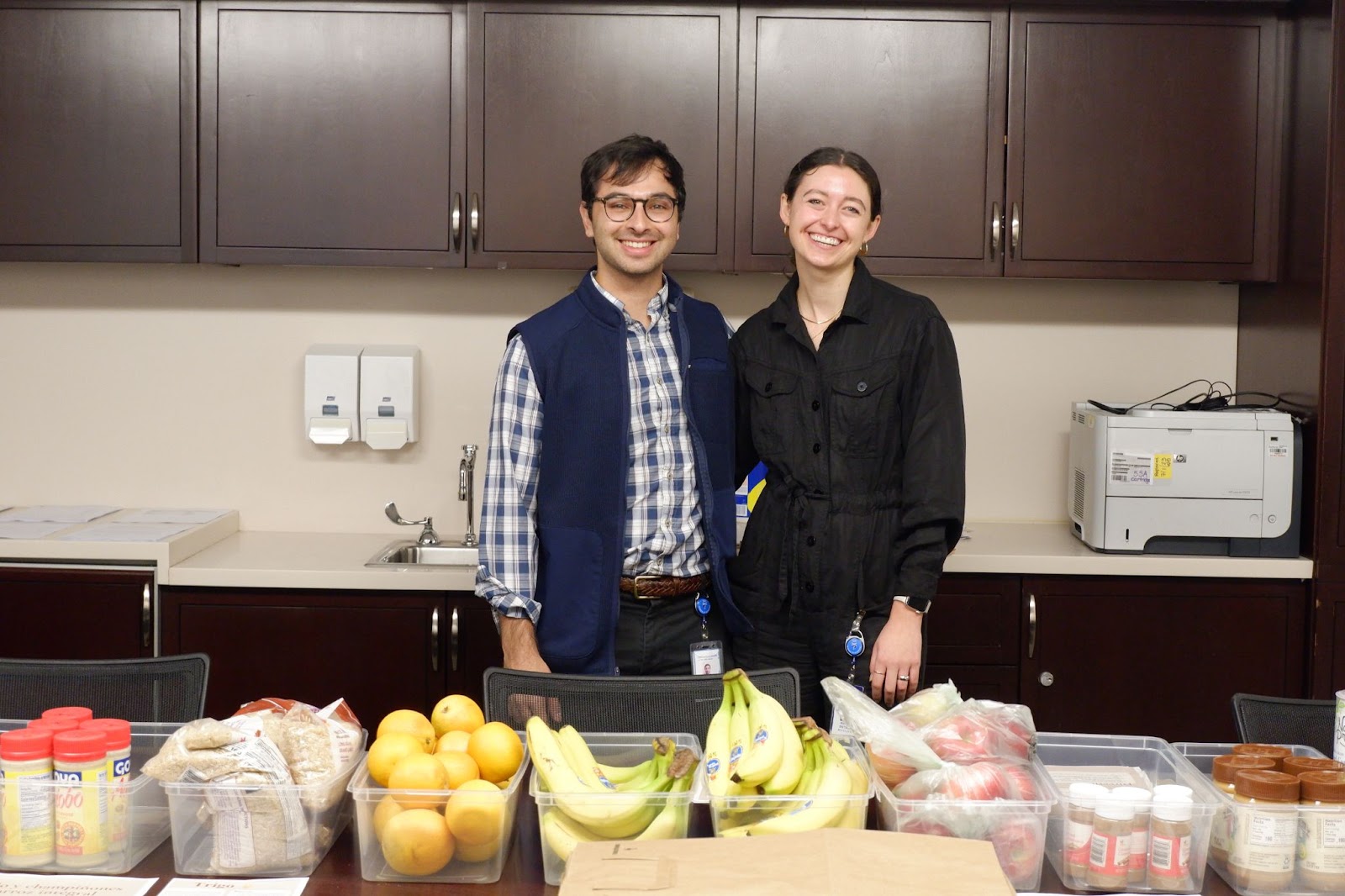Yale medical students start program to fight food insecurity in New Haven
The Food Pharmacy, a new initiative co-founded by Jason Weinstein MED ’27 and Katrina Dietsche MED ’27 is a part of the growing number of “food is medicine” programs nationally.

Shela Mensah, Contributing Photographer
Over one in five New Haven residents deal with food insecurity. In response, the student-run HAVEN Free Clinic started the Food Pharmacy, which aims to help combat the issue by “prescribing” nutrition education and providing healthy groceries to patients at the clinic.
In conjunction with the medical care patients receive at HAVEN Free Clinic, patients with chronic diseases such as diabetes and high blood pressure will be prescribed healthy meals tailored to their conditions. They then choose groceries provided by the Food Pharmacy to prepare those healthy meals.
The program hopes to illustrate the importance of the social determinants of health, such as lack of access to healthy food.
“I think that The Food Pharmacy is a necessary step in recognizing that health is ultimately decided by a number of social factors,” Bridgitte Thao ’27, a social services volunteer at HAVEN, said. “Most patients will benefit immensely from it.”
Inspired by other “food is medicine” programs, including one at The Children’s Hospital in Washington, co-founders Jason Weinstein MED ’27 and Katrina Dietsche MED ’27 saw the impact that nutritious food had on patients and wanted to do the same at HAVEN.
According to Dietsche, the two have been planning the program since their first year of medical school. For Weinstein, the initiative is particularly personal. As a first-generation American, his mother relied on free clinics for healthcare.
“In some ways, it kind of feels like I’m helping my mom retrospectively through this clinic,” Weinstein said. “I’m making sure that everyone that comes through has the care that my mom had.”
The program, officially launched at the HAVEN on Nov. 2, is coordinated by students. In addition to Weinstein and Dietsche, the team includes Siyun Li SPH ’26 and Priya Khimani SPH ’26 as dietary advisors, who design weekly meal plans tailored to patients’ conditions.
Additionally, Tomeka Frieson ’21 and Ju Hyun Lee GRD ’26 serve as research leads, measuring the program’s impact, while Shruti Parthasarathy ’24 SPH ’25 acts as a community liaison, connecting patients with resources and ensuring outreach efforts remain inclusive. Dr. Angela Kang-Giaimo and Dr. Nate Wood serve as faculty advisors.
“I’m always interested in ways that I can help others, especially Black and brown populations,” Frieson, who has volunteered at HAVEN for almost a year, told the News. “These are communities that I intend to serve for the rest of my life so seeing this opportunity come up … I found that it was a particularly interesting way that I could help others.”
The Food Pharmacy stands out from other food-insecurity initiatives in its prescription-based approach. Each week, patients choose from four meal options prescribed based on their health conditions and designed by Li and Khimani. These, for example, can include chicken with stir-fried brown rice, a healthy beef dish or breakfast pizza.
Beyond offering patients recipes, the Food Pharmacy also aims to educate patients on making healthy food decisions. The program prioritizes inclusion, making sure that recipe cards are available in both English and Spanish, as well as allergen cards.
Securing funding was essential to the launch of the Food Pharmacy. With support from the School of Medicine’s Development Office, the team applied and received a grant from the San Francisco-based Hellman Foundation. In addition, they received funding from the New Haven County Medical Association.
The funds will sustain the program for about two years, according to Weinstein, and are sufficient to serve 10 to 15 patients. However, the team would love to expand their service to all seventy patients at the HAVEN Free Clinic.
According to Dietsche and Weinstein, the Food Pharmacy has been very well-received among patients.
“[A] patient was telling us that they didn’t know exactly where their next meal was going to come from, for their son,” Weinstein said. “But now they didn’t have to worry about that because they were able to get enough groceries to provide for their son’s lunchbox.
Research leads Frieson and Lee are currently developing a proper study protocol to track patient outcomes to “ensure equity of impact,” according to Lee.
Readers can donate to the HAVEN Free Clinic’s Food Pharmacy at the Food Pharmacy’s For Humanity Campaign.
Interested in getting more news about New Haven? Join our newsletter!







